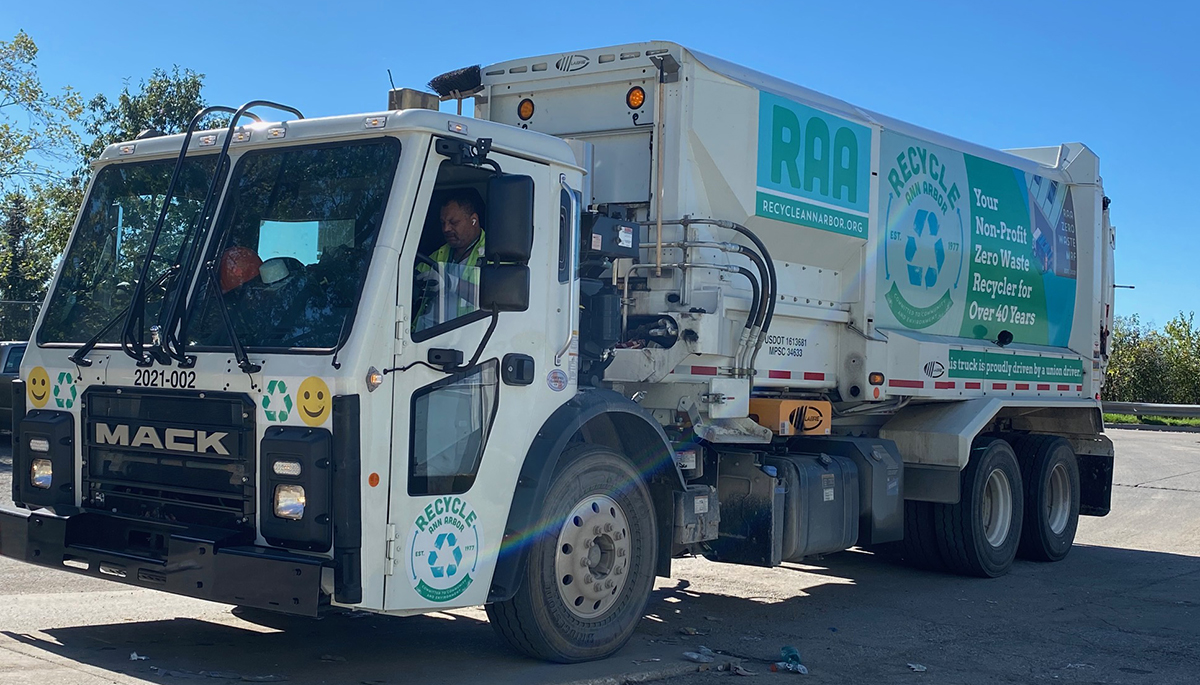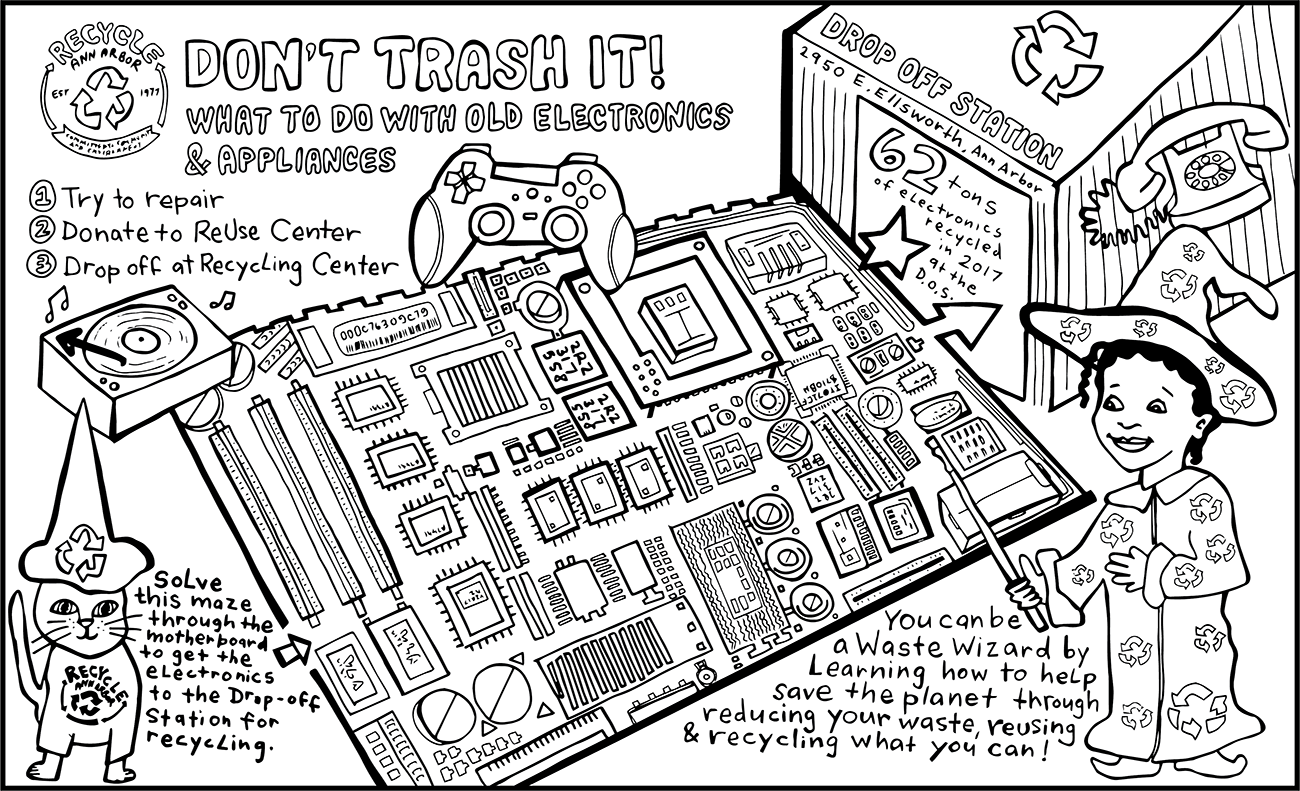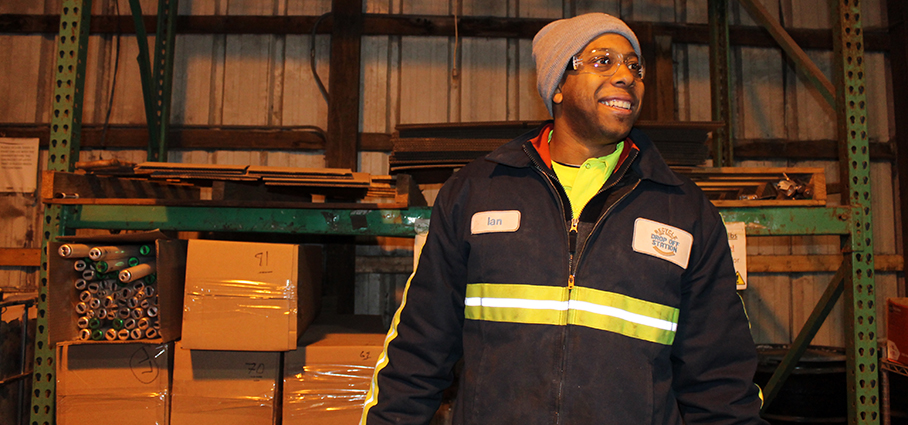All Divisions of Recycle Ann Arbor will be closed on Friday, July 4th. Friday's Curbside Pick-Up recycling will instead take place the following day on Saturday, July 5.
Recycle Ann Arbor's Guide to Better Recycling
Recycling materials instead of burying them in a landfill is a practical, accessible action that anyone can take to help the planet. Manufacturing products with recycled materials,
rather than using virgin materials, saves a lot of energy. Increasing recycling and reducing landfill usage decreases carbon emissions. Better recycling practices equate to higher
reductions in carbon emissions.
Common mistakes are making their way into the recycling bins and causing problems within the recycling system. Recycling contamination causes extra wear on the equipment,
increases the amount of material ending up in the landfill, and degrades the quality of recyclable material to be sold to end markets.
Recycle Ann Arbor is committed to helping the community recycle more and better. More recycling; better recycling; produces better results. That’s why we’ve created a guide to help keep out the top twelve contaminants making their way into Ann Arbor recycling bins and mucking things up.
DOWNLOAD THE GUIDE TO BETTER RECYCLING
1. Electronic Waste & Large Appliances
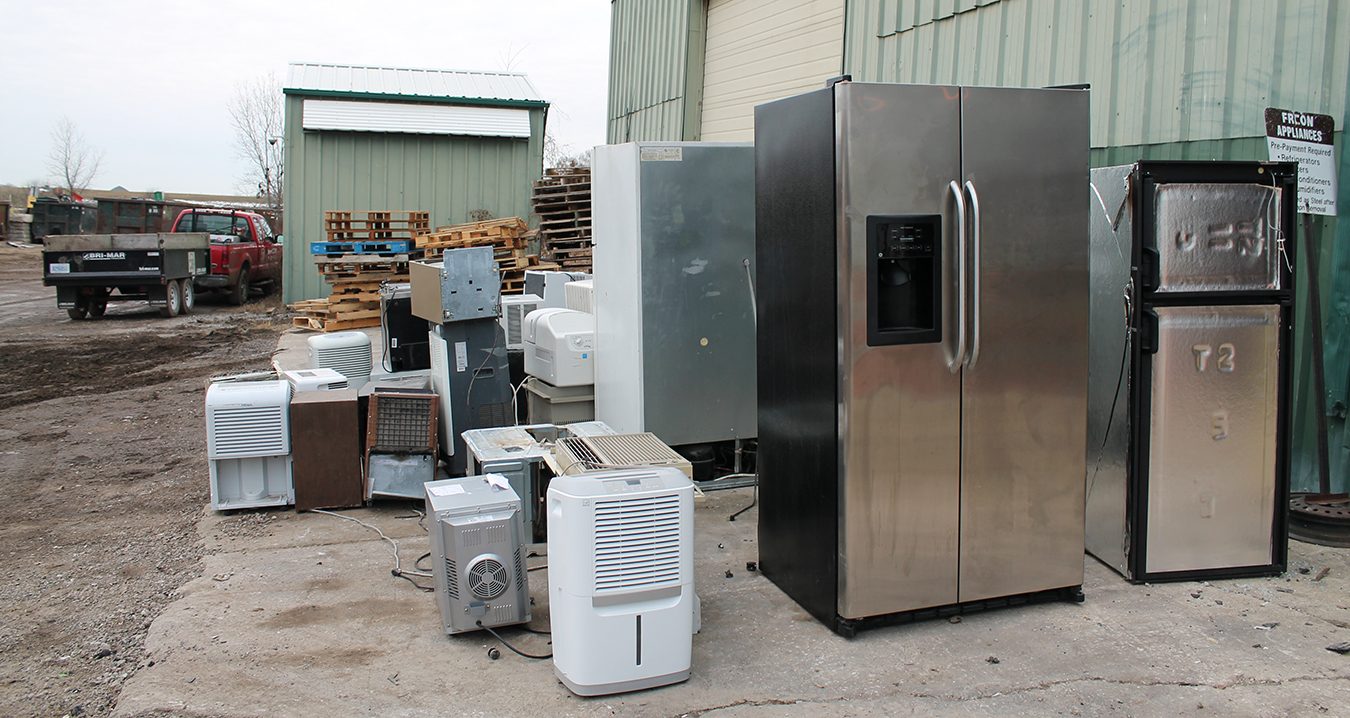
Why can't it go in the recycling bin?
Electronic waste (“E-waste”) or large appliances should not be put into (or placed next to) the curbside recycling or trash carts. The components in these items (arsenic, lead, mercury, Freon, etc.) need to be recycled separately/properly and should not be mixed in with the contents of residential recyclable items or placed into the landfill. Many of the components in E-waste can be melted down and used to make new products when recycled at a proper facility.
If I can't put it in the curbside blue bin, where can it go?
Before replacing electronics or appliances, ask yourself if you need the upgrade or if the item can simply be repaired. If you do need to dispose of E-waste or old appliances, do so responsibly and never in the landfill. Our Drop-Off Station (DOS) located at 2950 E. Ellsworth Rd. takes E-waste and old appliances for proper recycling and disposal. If your appliances are in good, reusable condition, consider contacting the A2 Area Reuse Network to see if they would take the item as a donation.
Don't Trash It!
A video series by Recycle Ann Arbor
Download Kid's Coloring Page
2. Clothing & Textiles
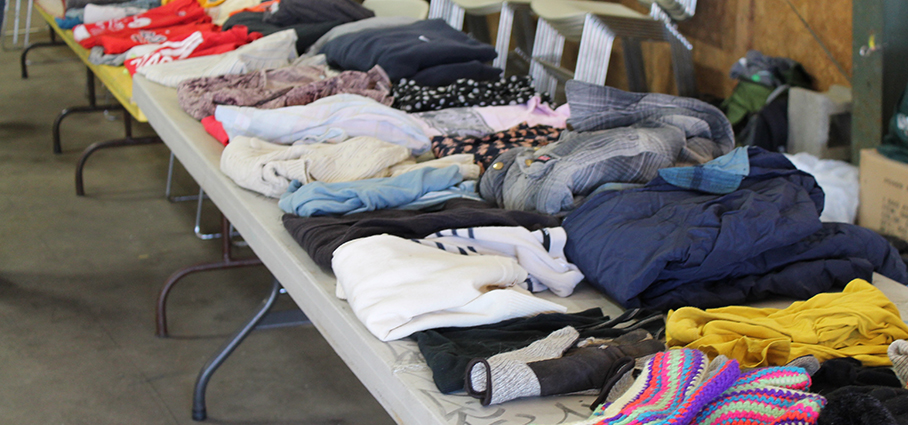
Why can't it go in the recycling bin?
Clothing or textiles placed in the recycling bin contaminate the recycling stream which is meant to be clean, residue-free, and only made up of items meant for recycling curbside (paper, plastics, glass, etc.). Although some clothing is made from a recycled post-consumer material, it cannot be processed in the residential curbside collection system. Many textiles can be reused or repurposed when donated or recycled at a proper facility.
If I can't put it in the curbside blue bin, where can it go?
Before replacing clothing or textiles, ask yourself if you need new items. Can they be repaired or repurposed? If clothing or textiles are in good, reusable condition, we recommend donating to local thrift stores. If you need to dispose of old textiles or clothing, our Drop-Off Station at 2950 E. Ellsworth Rd. will take textiles for recycling. Materials such as clothing, curtains, upholstery, bedding, towels, shoes, and soft toys can be dropped off in bags. Items of good quality will be distributed through local thrift shops while lower grade textiles will be recycled into new products.
3. Furniture
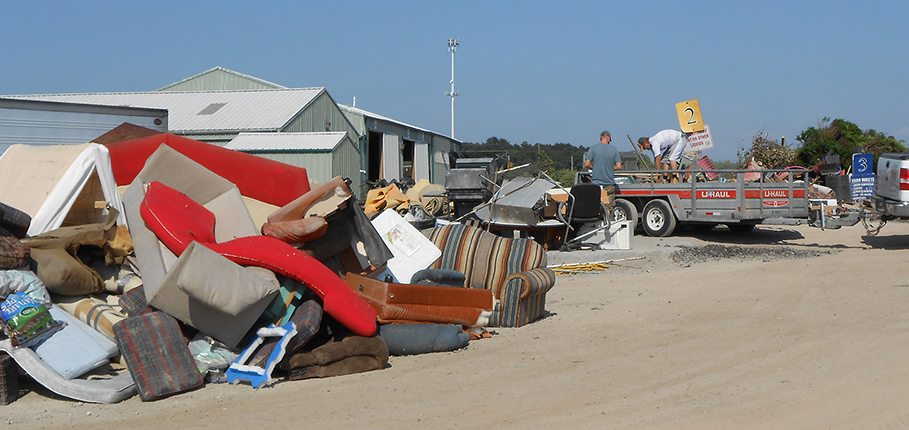
Why can't it go in the recycling bin?
Furniture (and broken off pieces of furniture) placed in the recycling bin contaminate the recycling stream which is meant to be clean, residue-free, and only made up of items meant for recycling curbside (paper, plastics, glass, etc.). Some furniture pieces (springs, wires, etc.) could also tangle up in the gears of recycling trucks and the sorting equipment at the MRF. Although some furniture is made from a recycled post-consumer material, it cannot be processed in the residential curbside collection system.
If I can't put it in the curbside blue bin, where can it go?
Furniture (and broken off pieces of furniture) should not be put into (or placed next to) the curbside recycling carts or trash. Furniture that is in good condition can be reused or repurposed when donated to a proper facility, please check the A2 Area Reuse Network to see if they would take the item as a donation. If the item of furniture is broken, or in very worn condition, our Drop-Off Station (DOS) at 2950 E. Ellsworth Rd. will take it for proper disposal. Disposal fees will apply per piece and by type of furniture.
4. General Trash
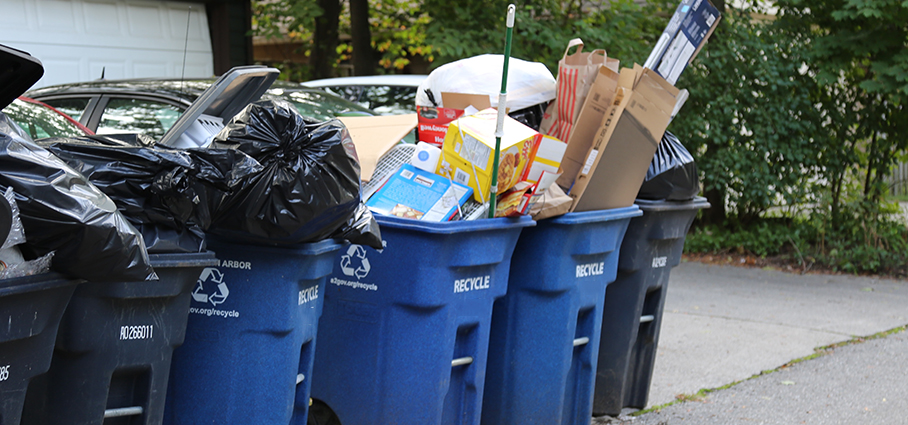
Why can't it go in the recycling bin?
Items not listed on the City of Ann Arbor recycling guidelines as “acceptable” are considered trash (for recycling) and should be placed into the trash carts. Trash items contaminate the recycling stream which is meant to be clean, residue-free, and only made up of items meant for recycling curbside (paper, plastics, glass, etc.). Common trash items we see making their way into the recycling stream include dirty diapers, black plastic bags full of unknown items, chip bags, granola bar wrappers, coffee cups, gum, etc.
If I can't put it in the curbside blue bin, where can it go?
Trash items are destined for the landfill in most cases simply because there is currently no ability or option to recycle, reuse, or repurpose them. A good waste mantra to follow is “when in doubt, throw it out!” If you don’t believe it’s recyclable based on the Ann Arbor guidelines, you should put the item into the trash cart. You can place trash items in your City of Ann Arbor curbside trash cart or bring large quantities of trash to our Drop-Off Station at 2950 E. Ellsworth Rd or our Recovery Yard at 7891 Jackson Rd. You can also look into TerraCycle for mail-back options for creative recycling/repurposing of some common trash items.
5. Construction Materials
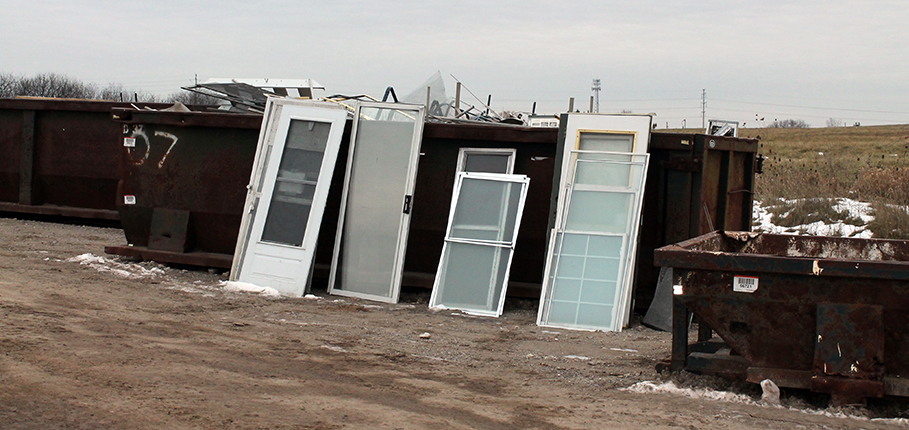
Why can't it go in the recycling bin?
Construction materials contaminate the recycling stream which is meant to be clean, residue-free, and only made up of items meant for recycling curbside (paper, plastics, glass, etc.). Many types of construction material (bricks, wires, concrete, etc.) can be reused or recycled when brought to a proper facility.
If I can't put it in the curbside blue bin, where can it go?
In some cases, construction material may be in good condition (old windows, bricks, paneling, etc.) and can be reused or repurposed when donated to a proper facility, please check the A2 Area Reuse Network to see if they would take the materials as a donation. However, the majority of construction material should be brought to our Recovery Yard located at 7891 Jackson Rd. which specializes in recycling construction and demolition (C&D) material. Additionally, our Drop-Off Station (DOS) at 2950 E. Ellsworth Rd. will also take some construction materials for proper disposal. Disposal fees will apply per cubic yard.
6. Light Bulbs (CFL) & Fluorescent Light Tubes
Why can't it go in the recycling bin?
CFL light bulbs and fluorescent light tubes should not be put into (or placed next to) the curbside recycling or trash carts. The components in these items (mercury in light tubes) need to be recycled separately/properly and should not be mixed in with the contents of residential recyclable items or placed into the landfill. Mercury in light tubes can be reused in new bulbs or products like thermostats. Glass and aluminum in bulbs can also be recycled and reused into new products when recycled at a proper facility.
If I can't put it in the curbside blue bin, where can it go?
When disposing of old light bulbs and fluorescent light tubes do so responsibly and never in the landfill. Our Drop-Off Station (DOS) located at 2950 E. Ellsworth Rd. takes both light bulbs and tubes for proper recycling and disposal.
7. Wood
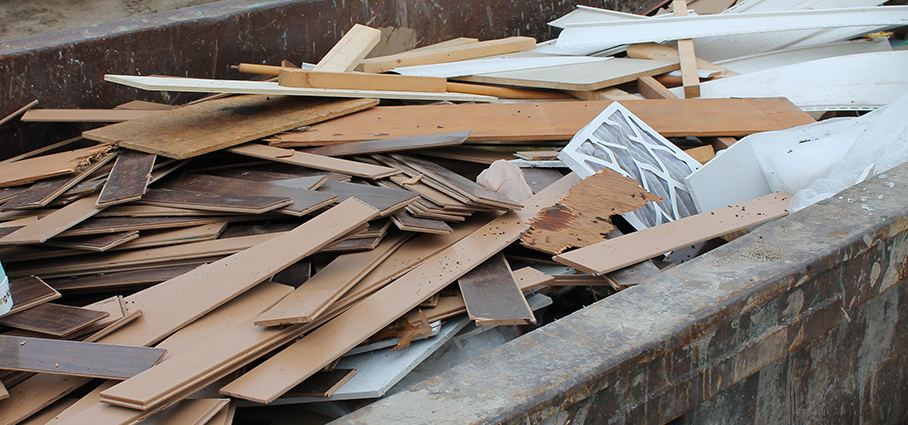
Why can't it go in the recycling bin?
Wood contaminates the recycling stream which is meant to be clean, residue-free, and only made up of items meant for recycling curbside (paper, plastics, glass, etc.). Wood can be reused or recycled into woodchips/mulch when brought to a proper facility.
If I can't put it in the curbside blue bin, where can it go?
Old wood pieces or wooden pallets may be in good condition and can be reused or repurposed through creative thinking. However, wood that needs to be disposed of should be brought to our Drop-Off Station (DOS) at 2950 E. Ellsworth Rd. Untreated wooden pallets and clean wood will be recycled (chipped) into mulch and woodchips. Disposal fees will apply per cubic yard for drop-off.
8. Food & Liquid Contamination
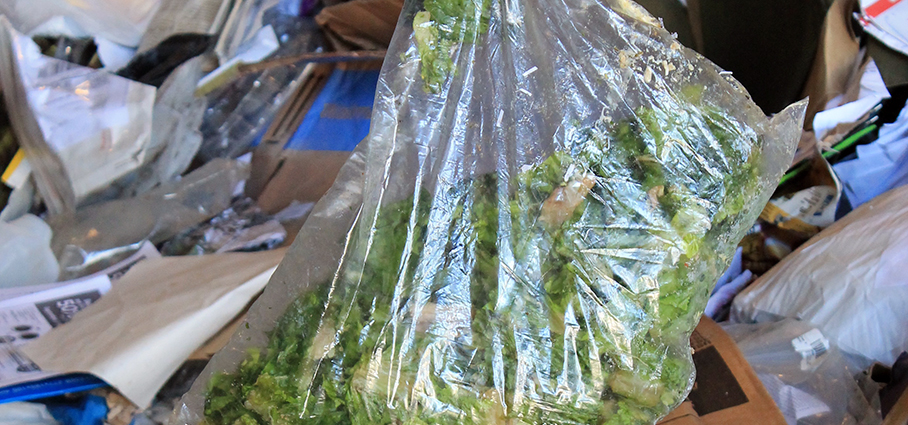
Why can't it go in the recycling bin?
It’s important to rinse recyclable food containers before putting them in the single-stream recycling bin. Contamination leads to lower valued recyclables, hurting the recycling industry. Food residue left in unrinsed recyclables is also harmful to the recycling sorting equipment. It draws unwelcome rodents to recycling sorting centers and creates unpleasant odors that make the working environment at recycling centers less enjoyable for the staff.
If I can't put it in the curbside blue bin, where can it go?
It is a good idea to rinse out food containers for a few seconds before depositing them into your recycling bin. You certainly do not need to wash them with soap, but emptying as much food waste into your compost bin as possible followed by a good rinse should do the trick. When you take the time to do this, you are helping create a cleaner recycling process that is less contaminated. Lower contamination = higher valued recyclables = more products made with recycled materials.
9. Plastic Bags & Plastic Film
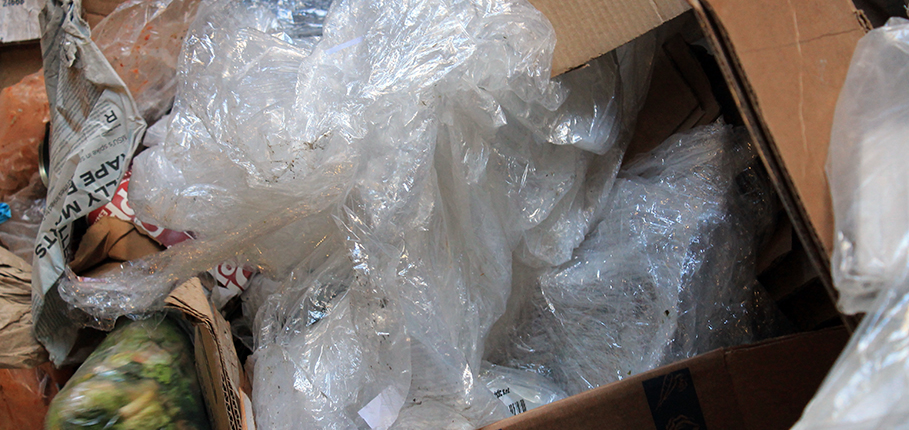
Why can't it go in the recycling bin?
Plastic bags and plastic film can’t be recycled in the curbside collection systems due in part to their structure, even though these items may have recycling symbols on them. Plastic bags and film can cause major problems as they tangle up in the gears of recycling trucks and the sorting equipment at the MRF (Material Recovery Facility). If plastic bags do get into the sorting process, they can clog up MRF machinery and shut down operations for hours in order to cut and remove jammed/clogged bags and film; this is dangerous to our staff and a waste of time and money. Place your recyclable items into the cart loose and do not bag them in plastic bags or plastic trash bags.
If I can't put it in the curbside blue bin, where can it go?
Say “no” to using plastic bags altogether and use reusable bags or paper bags instead when you purchase items. Additionally, put all your recyclables into the cart loose and do not put the items into plastic bags or plastic trash bags. If you have unavoidable plastic film from packaging or extra plastic bags, you can recycle them properly at our Drop-Off Station located at 2950 E. Ellsworth Rd. Plastic bags are baled separately from other materials at the DOS allowing them to be recycled and preventing them from contaminating other recyclables brought on-site. Many grocery stores also have boxes at their entrances for plastic bag recycling collection.
10. Yard Waste
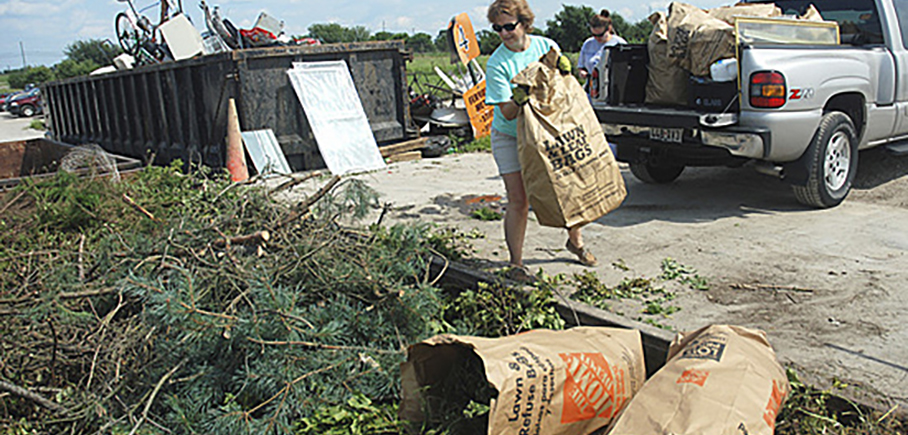
Why can't it go in the recycling bin?
Yard waste is considered organic material (not recyclable material) that can decompose into nutrient-rich compost. Compostable items placed in the recycling bin contaminate the recycling stream which is meant to be clean, residue-free, and only made up of items meant for recycling curbside (paper, plastics, glass, etc).
If I can't put it in the curbside blue bin, where can it go?
Many options exist in Ann Arbor for disposing of yard waste. The City of Ann Arbor provides seasonal curbside compost collection for those residents who elect to buy a cart. Additionally, the Drop-Off Station (DOS) located at 2950 E. Ellsworth Rd. and the City of Ann Arbor’s Compost Center located at 4150 Platt Rd. take yard waste from customer drop-offs. Residents can also choose to start their own backyard compost pile or purchase a compost tumbler system to deal with yard waste.
11. Food Waste
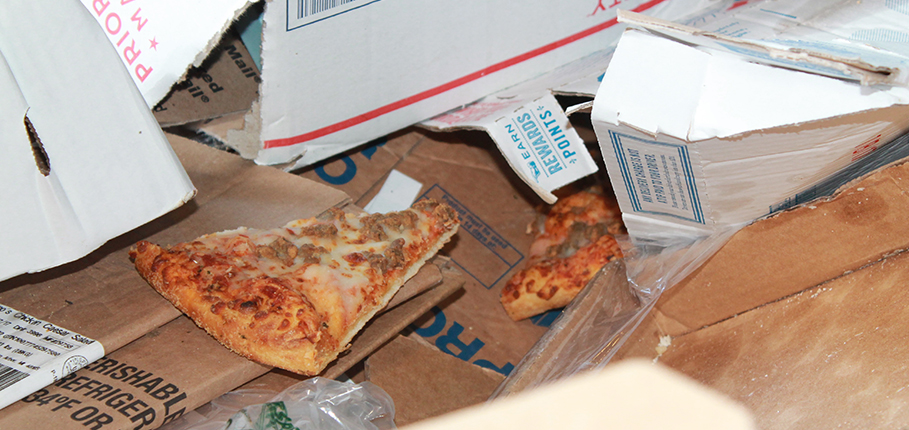
Why can't it go in the recycling bin?
Food waste is considered organic material (not recyclable material) that can decompose into nutrient-rich compost. When placed in the recycling bin, compostable items contaminate the recycling stream which is meant to be clean, residue-free, and only made up of items meant for recycling curbside (paper, plastics, glass, etc). When recycling an item that once held food (such as a pizza box), all the food should be removed, and the empty packaging should be rinsed clean from food residue.
If I can't put it in the curbside blue bin, where can it go?
Try to reduce food waste at the source by purchasing only what you need or will actually eat. However, leftovers are often inevitable, so options exist to compost food waste rather than landfill it. The City of Ann Arbor provides seasonal curbside compost collection for those residents who elect to buy a cart. The curbside compost collection allows residents to place their food waste (meat, bones, dairy, vegetable and fruit scraps, etc) into the cart for seasonal collection. Residents can also choose to start their own backyard compost pile to deal with select food waste.
12. Styrofoam & Packaging Materials
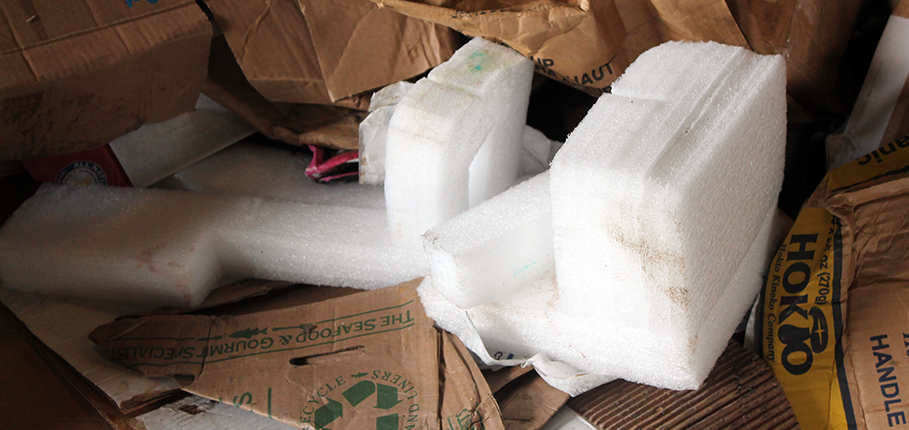
Why can't it go in the recycling bin?
Packaging material such as Styrofoam (foamed polystyrene), bubble wrap, packing peanuts, and packaging pillows are not recyclable curbside due in part to their structure. Even though these items might have recycling symbols on them, they can’t be recycled properly in the curbside collection system. Bubble wrap and packaging pillows can tangle up in the gears of recycling trucks and the sorting equipment at the MRF. In a curbside cart system, Styrofoam will often break apart and contaminate the paper, plastics, and other recyclable items in the shared space.
If I can't put it in the curbside blue bin, where can it go?
Try to reduce or reuse packaging material whenever possible. If you have too much though, you can recycle it at our Drop-Off Station (DOS) located at 2950 E. Ellsworth Rd. Styrofoam is recycled and baled separately from other materials at the DOS which allows it to be recycled into more Styrofoam products and not contaminate other recyclables brought on-site.
